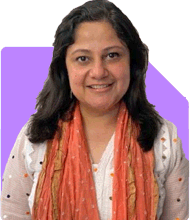Anu Krishna |1769 Answers |Ask -Follow
Relationships Expert, Mind Coach - Answered on Jun 13, 2023
The co-founder of Unfear Changemakers LLP, she has received her neuro linguistic programming training from National Federation of NeuroLinguistic Programming, USA, and her energy work specialisation from the Institute for Inner Studies, Manila.
She is an executive member of the Indian Association of Adolescent Health.... more

Hello anu My son is 15 years old. Am unable to understand how to talk to him without him snapping back at me. I m not the usual mom, am intelligent , foreign language teacher and a great mom n am still funbling wt how to deal with a teenaged son. Pls help me out
Welcome to the world of raising teens...sadly whatever parenting style worked up until now will have to re-hashed and a new way of thinking, executing, communicating has to be evolved.
All parents must understand another thing: raising children in a digital world is a challenge. Parents are accused by their children of being 'slow' at grasping things, understanding technology etc. Also, parents are constantly worried about predators of all kinds on different platforms.
Obviously with this and the strain of academics, parents, I have observed react impulsively (rightly so).
And this when it reaches the youngster is met by resistance, snapping, back-talk and more...
Changing the way of communicating (instead of instructions, try using questions) can help. Use subtle phrases like: I hear you, I see what you mean, I can only imagine how it must be for you...get the drift? A lot of support during the teen years can again bridge the gap between parents and children and provide a channel for free flow of communication both ways. Try this out...you can do this, I am sure of that :)
All the best!
You may like to see similar questions and answers below
Dr Aarti Bakshi | Answer |Ask -Follow
Child and Parenting Counsellor - Answered on Jul 24, 2023
Kanchan Rai |656 Answers |Ask -Follow
Relationships Expert, Mind Coach - Answered on Feb 09, 2025
Dr Ashish Sehgal | Answer |Ask -Follow
Relationships Expert, Mind Coach - Answered on Dec 12, 2024
Radheshyam Zanwar |6825 Answers |Ask -Follow
MHT-CET, IIT-JEE, NEET-UG Expert - Answered on Mar 02, 2026
Ravi Mittal |706 Answers |Ask -Follow
Dating, Relationships Expert - Answered on Mar 02, 2026
Ravi Mittal |706 Answers |Ask -Follow
Dating, Relationships Expert - Answered on Mar 02, 2026
Patrick Dsouza |1453 Answers |Ask -Follow
CAT, XAT, CMAT, CET Expert - Answered on Mar 02, 2026
Nayagam P P |10931 Answers |Ask -Follow
Career Counsellor - Answered on Mar 02, 2026
Nayagam P P |10931 Answers |Ask -Follow
Career Counsellor - Answered on Mar 02, 2026
Dr Deepa Suvarna |177 Answers |Ask -Follow
Paediatrician - Answered on Mar 02, 2026
Ramalingam Kalirajan |11047 Answers |Ask -Follow
Mutual Funds, Financial Planning Expert - Answered on Mar 02, 2026
Ramalingam Kalirajan |11047 Answers |Ask -Follow
Mutual Funds, Financial Planning Expert - Answered on Mar 02, 2026
T S Khurana |558 Answers |Ask -Follow
Tax Expert - Answered on Feb 28, 2026































